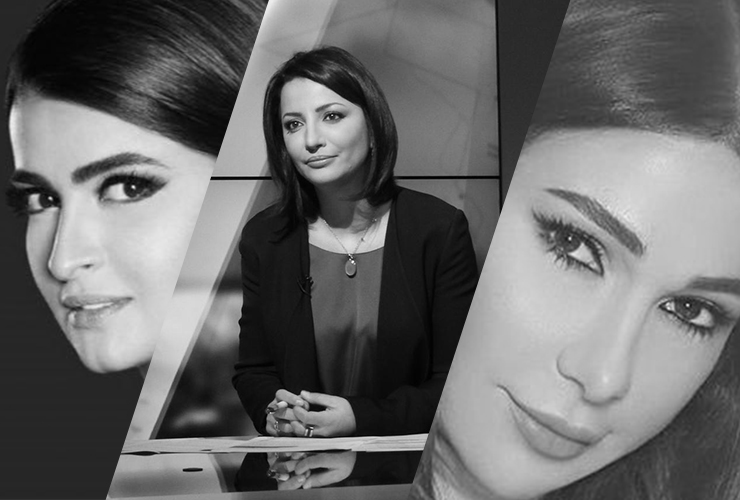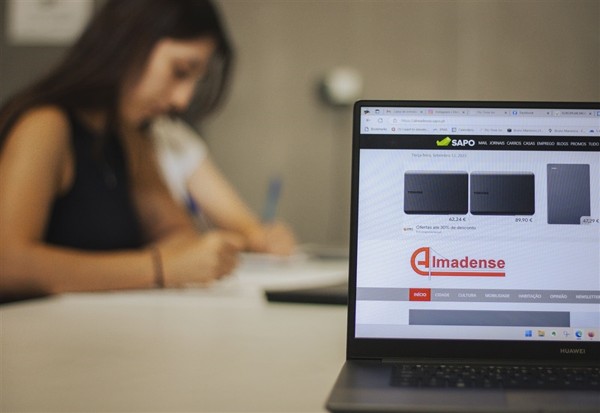“A friend alerted me to the fact that #Ghada_Jacuzzi was trending on Twitter late at night. The next day, I went to work as usual, even more motivated to continue producing unapologetic, quality journalism”, prominent Al Jazeera anchor and journalist Ghada Oueiss told the International Press Institute (IPI) in a recent interview.
Oueiss, known for her coverage of conflicts in the region and unflinching style of reporting, has been targeted by pro-Saudi social media accounts in a smear campaign after reporting new findings concerning the murder of Saudi journalist Jamal Khashoggi in early April 2020.
The posts that earned the campaign its impudent name circulated photos of Oueiss in a Jacuzzi. These were stolen from her phone after it was hacked, and paired with false allegations that the journalist obtained her position through sexual favors. “Other tweets include photoshopped images as well as caricatures of me in compromising positions, trying to discredit my work and dignity”, says Oueiss.
Online harassment of journalists and acts of intimidation are not rare occurrences in the Middle East: Recently, a fellow news broadcaster for Al Jazeera, Jamal Rayyan, received death threats after criticizing Saudi Arabia on Twitter. Yemeni journalists covering the country’s ongoing conflict have been facing death threats, and earlier this year journalists for the BBC’s Persian service encountered online harassment when reporting on anti-government protests.
But when female journalists are the target, the attacks quickly take a misogynistic turn. Oueiss’s colleague Ola Al-Fares has also been targeted by the Saudi troll army in a campaign under the hashtag #Ola_Sauna, calling on the Jordanian journalist to give up on her profession in favor of providing sexual services. “It seems these people are unable to accept that a woman can succeed on merit and hard work”, Oueiss, who was disappointed to discover the two hashtags were among the top 5 trending on Twitter at the time, said.
[Thread]1/ I see a lot of disgusting things online, but tonight the level of high level misogyny on ‘Gulf Twitter’ is astounding. There is a systemic campaign to smear two women journalists @OlaAlfares and @ghadaoueiss, who work for Al Jazeera. The campaign involves thousands pic.twitter.com/F1goEDtrsT
— Marc Owen Jones (@marcowenjones) June 9, 2020
Events such as these pose a great threat to journalists’ ability to report freely and truthfully. According to a 2019 study by Northwestern University in Qatar, fewer MENA nationals trust their countries’ mass media outlets, and are more likely to turn to social media for news and information.
Autocratic masterminds appear to be well aware of that fact, as they have been diligently utilizing these platforms to discredit and eliminate professional journalists as well as government critics. While social media was anticipated by some to be a tool promoting democratization of the region in the Arab Spring, others saw it as an opportunity to advance their interests: Saud al-Qahtani, who served as royal court advisor to crown prince Mohammad Bin Salman Al Saud until 2018, is said to be the strategist behind Saudi Arabia’s social media approach, as well as the assassination of journalist Jamal Khashoggi.
In 2017, Qahtani initiated the #BlackList campaign, encouraging Saudi Twitter users to compile the identities of those showing sympathy with Qatar. This initiative was endorsed by UAE officials as well as local Twitter users who added names under the #Blacklist – the beginning of a well-oiled troll-farm machine.
The New York Times reported in 2018 on a troll farm in Riyadh that employed hundreds of users who meticulously crafted new strategies to target critics on Twitter without violating the platform’s ethical guidelines. But more recent voices suggest Saudi Arabia enjoys a comfortable relationship with Twitter, which might explain Oueiss’s dissatisfaction with the company’s handling of her complaints: “The accounts targeting me weren’t all troll accounts – many of them are verified accounts of real people with many followers”, Oueiss said. “But Twitter was very slow to take action despite my requests. Only after my photos reached thousands in the Arab world, some of the accounts were blocked.”
But in other parts of the Middle East, similar campaigns are being carried out without the help of sophisticated troll farms.
Dima Sadek, former LBC reporter and political show host, was subject to online harassment after voicing her support for anti-government protests in Lebanon that began in late 2019. Fake photos sexually objectifying Sadek were spread online and sent to the journalist’s mother, who suffered a stroke and was hospitalized shortly after. Rachel Karam, Nancy Sabeh, Halima Tabiaa, Ramez Qadi ou Layal Saad are among other Lebanese journalists reportedly being targeted by online defamation campaigns of a misogynistic nature. In an interview with the Lebanese L’Orient-Le Jour, Layal Saad revealed that she had to block 1,500 accounts on social media, many of them associated with Hezbollah.
While they may cause discomfort, these attacks don’t stop Oueiss from continuing to fulfill her journalistic duties objectively and unequivocally. “But”, she added, “it’s worrying how a virtual thing can become so real”. She recalled a conversation with colleague Jamal Khashoggi weeks before his assasination in which he advised her to “simply ignore online trolls”. Despite the threat of offline attacks, Ghada Oueiss has but one objective: “No matter how brutal these campaigns are, I will not let them undermine this fundamental pillar of a free society.”
Since 2014, the International Press Institute (IPI) has been systematically researching online harassment as a new form of silencing critical, independent media. Our work has unveiled patterns of online attacks, analysed the emotional and professional impact on journalists, and collected best practices for newsrooms to address the phenomenon.


